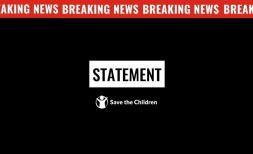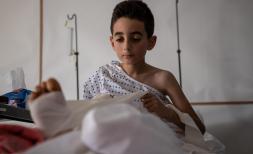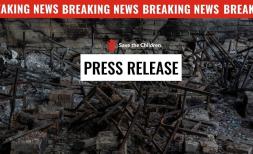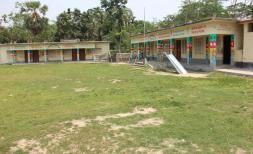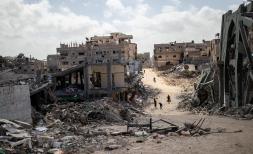Gaza: Rate of attacks on healthcare higher than in any other conflict globally since 2018
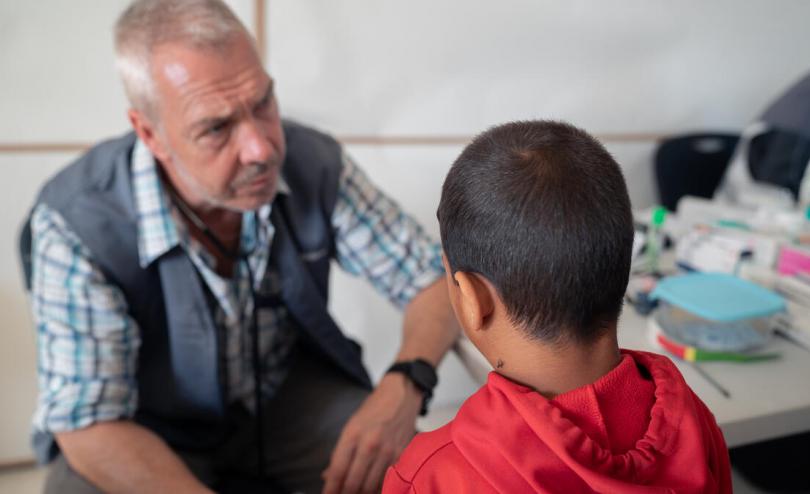
Dr Simon Struthers, a Save the Children pediatrician offering care to children in Rafah [Soraya Ali/Save the Children]
Health workers report an influx of children with wounds and lost limbs, often needing skin grafting and multiple operations
GAZA, 22 April - The rate of attacks per month on healthcare in Gaza since the beginning of the war has been higher than in any other recent conflict globally, standing at an average of 73 attacks each month, according to new analysis by Save the Children.
There have so far been at least 435 attacks on health facilities or personnel across Gaza in six months of conflict between 7 October 2023 and early April 2024 – equivalent to 73 attacks per month of war, according to the World Health Organization (WHO). This number exceeds the number of attacks per month in all other war-torn countries since 2018, including Ukraine who have the second highest number at 67 attacks per month, and the Democratic Republic of Congo with an average of 11 attacks per month.
Attacks on healthcare in the occupied Palestinian territory haven’t been limited to Gaza, with 421 attacks also reported in the occupied West Bank in the last six months. These include 302 obstructions to health access, and the use of force within health facilities.
The WHO classifies an attack on health care as any instance of violence against or any obstructions that interfere with delivery or access to, health services during emergencies, including psychological threats and intimidation of patients and workers.
Six months of constant bombardment, siege and obstruction of aid deliveries have annihilated the health system in Gaza. Only 11 hospitals out of 36 are partially functioning and the Palestinian Central Bureau of Statistics (PCBS) reported that some 350,000 people suffering from chronic diseases in Gaza are unable to access vital medicines, supplies, and services.
Save the Children’s Emergency Health Unit are currently assisting children through a field hospital recently established by a partner in Rafah that offers primary health care to over 200 people a day, 40% of them children.
Becky Platt, a pediatric nurse at the hospital said:
“We’ve recently seen an influx of children from other hospitals with wounds and lost limbs, often needing skin grafting and multiple operations, but even getting hold of simple things like strong pain relief is a major challenge. When children have to undergo a procedure to save their limb and avoid infection, we are forced to do it with less pain relief than we’d normally use. So, I brought bubbles and games on my phone to distract them, but the reality is that a lot of these procedures need strong pain relief. That is causing huge distress, and it will also add to long term psychological damage."
She added:
“We treated a 10-year-old boy who had some shrapnel in his thigh that had shattered his femur. He lost a lot of muscle and tissue, so he needed skin grafting and also had an external fixator on the leg. He had multiple operations, but he was so distressed by the way his leg looked that he couldn’t even look at it. He was doing this silent crying that was heartbreaking. But this is a standard story. Children are psychologically destroyed by everything that’s happened."
Doctors in Gaza say that a large part of their surgery is on children, and that the lack of food available often means that patients are not strong enough to heal properly or fight off infection. At least 28 children have died already because of malnutrition and dehydration, according to the Ministry of Health in Gaza.
Dr Simon Struthers, a pediatrician at the field hospital in Rafah said:
“We see acute respiratory infections, malnutrition cases, scabies, hepatitis A. I've seen more jaundice in the last two weeks than in my whole career. We treat many children with acute gastroenteritis, one type that spreads via fecal routes. Handwashing would reduce this, but now everyone is displaced, living in tents and unfortunately, overcrowding and lack of sanitation or clean water increase the risks.”
“Chronic pediatric problems are extremely challenging - cerebral palsy for example, or similar diseases that can’t be treated. Everything is on pause, including standard operations,” Simon explained, adding that the lack of medicines like steroid creams and antibiotic ointments hampers the treatment of simple diseases.
The lack of security further compounds the challenges in accessing healthcare services. Israeli forces have hit ambulances, medical aid convoys and access roads, hospitals have become battlefields and WHO said that between mid-October and the end of March, over half of their missions in Gaza have been denied, delayed, impeded, or postponed.
Dr Simon added: “We can't take risks and have to be careful which route we take, because of what's going on and we’re fearful of what’s coming from Israeli forces, rather than the local population who are very supportive of us. We're constantly reminded of the risks, and our staff spend some evenings learning how to use trauma dressings and tourniquets in case they are needed."
Xavier Joubert, Save the Children’s Country Director in the occupied Palestinian territory, said:
“After six months of unimaginable horror, the healthcare system in Gaza has been brought to its knees. Healthcare workers are risking their lives daily to give Palestinian children a chance at survival. The constant attacks on healthcare are simply unjustifiable and must stop. Palestinian children must have unimpeded access to services, including healthcare and education.”
Save the Children has been providing essential services and support to Palestinian children impacted by the ongoing conflict since 1953. Save the Children’s team in the occupied Palestinian territory has been working around the clock, prepositioning vital supplies to support people in need, and working to find ways to get assistance into Gaza.
Multimedia content available here and here.
Notes
WHO defines an attack on health care as ‘verbal or physical violence, obstructions or threat of violence that interfere with delivery or access to health services during emergencies, including psychological threats and intimidation of patients and workers, using hospitals and health facilities for military purposes or most commonly, attacks on health facilities and people using weapons’.
[1] Data taken from the WHO Surveillance System for Attacks on Health Care (SSA) https://extranet.who.int/ssa/Index.aspx. Gathering data on attacks on health is more challenging in some contexts where governments for example do not provide regular updates and as such some contexts might be under-reported in UN data. Gaza breakdown is taken from WHO Situation Reports. While the war in Ukraine has recorded a higher number of attacks on health in total -1,734 attacks over almost 26 months - these have been at a lower rate, having taken place over a longer period.
[2] Rate and number of attacks on healthcare in the top three crises (by number of attacks since 2018 or start of conflict if later) as per the WHO Surveillance System for Attacks on Health Care (SSA) database, 2018 – 2024:
Country/conflict | Period of conflict | Number of attacks | Attacks per month |
oPt (West Bank and Gaza) | Oct 2023- date | 856 | 143 |
oPt (Gaza only) | Oct 2023- date | 435 | 73 |
Ukraine | Feb 2022- date | 1,734 | 67 |
DRC | Jan 2018- date | 537 | 11 |
[3] Includes attacks classified by WHO as confirmed, probable or possible. All attacks in oPt in our analysis period since October 2023 are classified by WHO as confirmed.
Ukraine has seen the second-highest rate of attacks on healthcare at 67 incidents per month since 2018, the date from which systemic records in the WHO Surveillance System for Attacks on Health Care (SSA) database began. There have been over 1,700 documented attacks on health in Ukraine in the two years since the escalation of the war in February 2022.
For further enquiries please contact:
Randa Ghazy, Regional Media Manager for North Africa, the Middle East and Eastern Europe: Randa.Ghazy@savethechildren.org;
Our media out of hours (BST) contact is media@savethechildren.org.uk / +44(0)7831 650409
Please also check our Twitter account @Save_GlobalNews for news alerts, quotes, statements, and location Vlogs.
